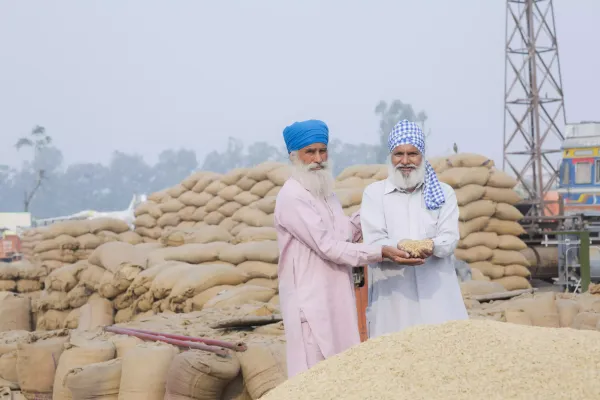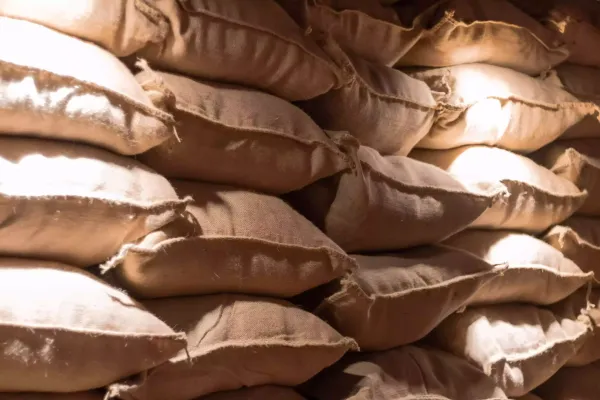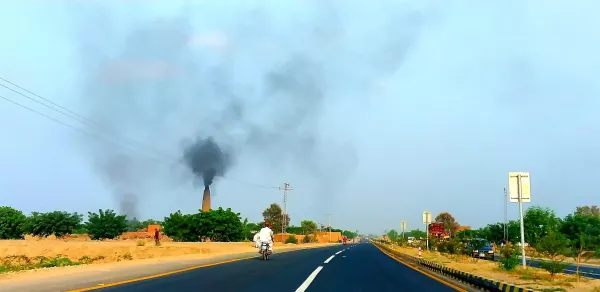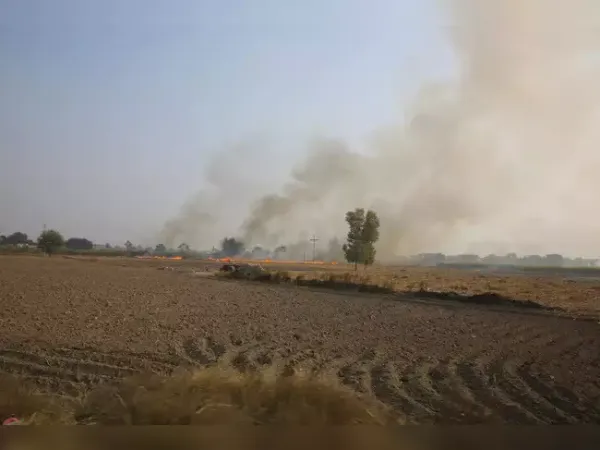Farmers often struggle to get their produce to the market on time. Harpal Singh, however, ensured his paddy crop reached Punjab’s Khanna grain mandi, one of India’s biggest cereal wholesale markets, in time for government procurement. But his chances of selling it for a fair price anytime soon is getting bleaker by the day.
“Paddy is arriving in large quantities to this market everyday," explains the 38-year-old farmer from Kauri. “But the officials are going slow when it comes to buying the stock because mandis simply don’t have adequate space to store the fresh crop. This has forced many farmers to sell at lower prices, so that they can dispose of their produce before it loses quality. Arthiyas (middlemen) told me that I would have to sell my crop at prices lower than the government’s minimum support price (MSP).”
Many farmers in Punjab are staring at the prospect of selling their crops at a low price due to the delay in stock lifting by the authorities. The Punjab government and the central government are responsible for smooth procurement and transportation of crops, so they should take the blame for the situation, say farmers.
Some farmers are responding to the situation by delaying harvest. Satbir Singh, a 52-year-old farmer from Phagwara, says he has already sold output from 20 acres of his farm at low prices. “I have 35 acres more but have not harvested that yet.”
But that is going to start a new problem, says a middleman in Mansa mandi. The moisture content in paddy decreases over time, and this leads to a weight loss of 1-2 kg per quintal. So delayed harvest would mean lower quantity and reduced price for farmers.
 Experts point out that a delay in harvesting can reduce the time available to manage stubble, resulting in more cases of crop burning to prepare the fields for wheat sowing, by the middle of November.
Experts point out that a delay in harvesting can reduce the time available to manage stubble, resulting in more cases of crop burning to prepare the fields for wheat sowing, by the middle of November.
‘Space crunch’ at mandis
Mohali-based food policy expert Devinder Sharma says a “political slugfest” between the Punjab government and the Centre is holding the state’s paddy farmers to ransom. “For over 30 days, farmers have not been able to sell paddy in the mandis. They are being forced to continue to irrigate their ripe crops and delay harvest. Just a few days are left for the start of the next sowing, which is wheat. There is going to be more stubble burning,” adds Sharma.
But what is causing this problem this year?
Every year, paddy procurement starts after the Centre, the state and the Food Corporation of India (FCI) have a discussion. Procurement for the kharif marketing season (KMS) 2024-25 in Punjab began on October 1 and will continue till November 30. The Centre targets procuring 185 lakh tonnes (LT). The state’s agencies procure paddy and hand it over to millers to convert the produce into rice. This is then handed over to the FCI, which stores it in its warehouses and moves it to the consuming states for distribution under the public distribution system (PDS). So, it is important to clear out the previous season’s rice stocks to make space for the new crop.
In KMS 2022-23, FCI in Punjab took delivery of nearly 124 lakh tonnes (LT) of rice; but it could move out only 7 LT as of September 2024. On October 1, 2023, FCI had rice stock of 60 LT, which rose to 121 LT on September 1 this year. Punjab expects about 185 lakh tonnes of paddy this season but the state’s warehouses don’t have space to accommodate the stock of KMS 2024-25.
At a press conference on October 27, Union Food Minister Prahlad Joshi had said Punjab has storage capacity of 14 lakh tonnes, which will increase to 16 lakh tonnes by November 1. An additional 31 lakh tonnes is being developed under the Private Entrepreneur Guarantee (PEG) scheme.
Political slugfest
The Centre and the state should have cleared the old stock by May 31, says Kirti Kisan Union (KKU). Now the situation is moving at a snail’s pace, says KKU’s Press Secretary Raminder Singh Patiala. “If 10 trucks were deployed at a mandi last year to lift the stock, only 3-4 have been deployed this year. Even this happened only after farmers started raising their voice,” adds Patiala.
On November 3, the Centre had said that while the procurement started a bit late due to heavy rains in September and high moisture content in paddy, it has picked up in full swing. According to the Union Ministry of Consumer Affairs, Food & Public Distribution, 2,927 designated mandis and temporary yards are operational throughout the state for smooth procurement from farmers. The Centre said on November 9 that paddy lifting from the mandis is more than the daily arrival quantity and as such paddy procurement is going on smoothly. “A total quantity of 126.67 LMT of paddy has arrived in the Punjab mandis as of 8 November, out of which 120.67 LMT has been procured by state agencies and Food Corporation of India (FCI).,” the Centre said.
 However, experts point out that “procurement” is different from "lifting" — the former refers to state agencies signing deals to buy the produce and make the payments; lifting refers to transportation of the stock from the mandis to designated storage areas.
However, experts point out that “procurement” is different from "lifting" — the former refers to state agencies signing deals to buy the produce and make the payments; lifting refers to transportation of the stock from the mandis to designated storage areas.
Union Minister of State for Railways and for Food Processing Ravneet Singh Bittu — a prominent face of the BJP in Punjab — blames the AAP government in the state for failing to perform its duty of procuring paddy from the farmers. “The state machinery has completely collapsed in paddy procurement. The Punjab government showed complete negligence during the procurement period just to divert the attention from their failure to the Union government. The FCI had sanctioned extra storage space of 31 LT last year but the state government has failed to even float the tenders to realise this,” adds Bittu.
ET Digital has emailed the FCI for clarification, but has not got a response yet.
Even the Leader of Opposition in Punjab, Pratap Singh Bajwa, a veteran Congress functionary, blames the state government for “calculated betrayal” of the farmers. “This betrayal is visible in every grain market across Punjab. The state government has utterly failed to manage the procurement chain, leaving farmers and millers stranded. It’s a calculated negligence from both state and central governments. The farmers have been compelled to sell their produce for Rs 300 less than the MSP, resulting in losses exceeding Rs 5,500 crore to the farmers,” said Bajwa.
Punjab’s Minister of Food, Civil Supplies and Consumer Affairs, Lal Chand Kataruchak, had not replied to a request for comment when this story was published.
Millers in a fix
Sharma says the issue has been exacerbated due to a strike by arhtiyas as well as rice millers over issues related to lifting and quality of produce.
The 5,600-odd rice mills in Punjab have refused to pick up paddy for processing into rice as they claim lack of storage space. Millers argue that they face a prospective loss of Rs 300 a quintal as new varieties such as PR-126 give 62 kg of rice from every quintal of paddy; others give 67 kg. So they get a lower quantity of stock. Bajwa claims that rice millers will face a loss of Rs 6,000 crore if they lift this stock.
The state government had encouraged sowing of new hybrid varieties claiming these require less water; the state has a water crisis.
“Now the question is who will buy these hybrid rice produce? The farmers who used these seeds, believing the government, are now in a fix. They are being forced to do distress sales,” says Patiala.
To add to the woes, the Centre’s out of turn ratio (OTR) norms, which dictate the paddy-to-rice conversion ratio, are uniform across India and do not account for differences in seed variety, says Deepak Pareek, Director Global Trade and Partnership, Indian Chambers of Food and Agriculture (ICFA).
 On October 22, the Punjab government had set a four-day deadline for rice millers to lift paddy from mandis, threatening to otherwise give the crop outside the state. Union Food Minister Joshi had thereafter invited Punjab’s millers for a meeting in Delhi.
On October 22, the Punjab government had set a four-day deadline for rice millers to lift paddy from mandis, threatening to otherwise give the crop outside the state. Union Food Minister Joshi had thereafter invited Punjab’s millers for a meeting in Delhi.
Bharat Bhushan Binta, President of Punjab Rice Industry Association, says 4,100 millers have now entered into an agreement with the government for shelling. But 1,300-1,400 of these millers are not ready to dehusk hybrid varieties that mature in 90 days because of lower quantity of rice. So they claim losses. “This has been a big issue in areas such as Gurdaspur, Hoshiarpur, Taran Taran….”
According to him, the supply of rice has increased as more states are growing the crop due to paddy MSP. This means that the lack of space to store paddy and the issues related to that could only increase.
Arthiya commission
Rice production in the recently concluded kharif season is expected to be 120 MT, up 5.9% from a year ago, according to the first advanced estimate for 2024-25 (July-June) released on November 5.
Binta says there is an urgent need for “a different procurement infrastructure”. “Earlier, millers used to manage the operations. But they are unwilling to do so now.” The president of Punjab Rice Industry Association suggests diverting some rice stocks towards ethanol production, to make space for new produce.
Another barrier to paddy lifting is arthiyas commission. The state government had fixed the arthiyas commission at Rs 46 per quintal of paddy. But the middlemen want 2.5% of MSP as commission instead of a fixed remuneration.
On August 28, around 8,000 arthiyas participated in a rally demanding a new payment system. As these middlemen sometimes buy stocks from farmers, they are facing trouble as rice millers’ purchase has gone down. So they are left with excess stock. They had earlier even urged farmers to withhold bringing their produce to market until the situation is resolved.
 Rahul Chauhan, Director of commodity market research company iGrain India, says the problem with paddy can be solved by selling wheat through an open market sale scheme (OMSS) — a programme that sells food grains at reduced prices through e-auction. “The market is in dire need of wheat compared with rice. The stock of wheat is already low in the central pool. If the warehouses remain stocked like this, there may be problems in wheat storage,” adds Chauhan.
Rahul Chauhan, Director of commodity market research company iGrain India, says the problem with paddy can be solved by selling wheat through an open market sale scheme (OMSS) — a programme that sells food grains at reduced prices through e-auction. “The market is in dire need of wheat compared with rice. The stock of wheat is already low in the central pool. If the warehouses remain stocked like this, there may be problems in wheat storage,” adds Chauhan.
Stakeholders say that the entire ecosystem of agriculture stakeholders including the Agricultural Produce Market Committee (APMC) structure is under stress. Patiala alleges that this was another deliberate attempt by the Centre to push its “pro-corporate model” in agriculture. “The state government’s delayed response only made the matters worse for the farmers. It will create more stubble burning as a farmer has to clear old harvest and start preparing to sow new wheat crops within a narrow time window,” adds Patiala.
“Paddy is arriving in large quantities to this market everyday," explains the 38-year-old farmer from Kauri. “But the officials are going slow when it comes to buying the stock because mandis simply don’t have adequate space to store the fresh crop. This has forced many farmers to sell at lower prices, so that they can dispose of their produce before it loses quality. Arthiyas (middlemen) told me that I would have to sell my crop at prices lower than the government’s minimum support price (MSP).”
Many farmers in Punjab are staring at the prospect of selling their crops at a low price due to the delay in stock lifting by the authorities. The Punjab government and the central government are responsible for smooth procurement and transportation of crops, so they should take the blame for the situation, say farmers.
Some farmers are responding to the situation by delaying harvest. Satbir Singh, a 52-year-old farmer from Phagwara, says he has already sold output from 20 acres of his farm at low prices. “I have 35 acres more but have not harvested that yet.”
But that is going to start a new problem, says a middleman in Mansa mandi. The moisture content in paddy decreases over time, and this leads to a weight loss of 1-2 kg per quintal. So delayed harvest would mean lower quantity and reduced price for farmers.

Experts point out that a delay in harvesting can reduce the time available to manage stubble, resulting in more cases of crop burning to prepare the fields for wheat sowing, by the middle of November.
‘Space crunch’ at mandis
Mohali-based food policy expert Devinder Sharma says a “political slugfest” between the Punjab government and the Centre is holding the state’s paddy farmers to ransom. “For over 30 days, farmers have not been able to sell paddy in the mandis. They are being forced to continue to irrigate their ripe crops and delay harvest. Just a few days are left for the start of the next sowing, which is wheat. There is going to be more stubble burning,” adds Sharma.
But what is causing this problem this year?
Every year, paddy procurement starts after the Centre, the state and the Food Corporation of India (FCI) have a discussion. Procurement for the kharif marketing season (KMS) 2024-25 in Punjab began on October 1 and will continue till November 30. The Centre targets procuring 185 lakh tonnes (LT). The state’s agencies procure paddy and hand it over to millers to convert the produce into rice. This is then handed over to the FCI, which stores it in its warehouses and moves it to the consuming states for distribution under the public distribution system (PDS). So, it is important to clear out the previous season’s rice stocks to make space for the new crop.
In KMS 2022-23, FCI in Punjab took delivery of nearly 124 lakh tonnes (LT) of rice; but it could move out only 7 LT as of September 2024. On October 1, 2023, FCI had rice stock of 60 LT, which rose to 121 LT on September 1 this year. Punjab expects about 185 lakh tonnes of paddy this season but the state’s warehouses don’t have space to accommodate the stock of KMS 2024-25.
At a press conference on October 27, Union Food Minister Prahlad Joshi had said Punjab has storage capacity of 14 lakh tonnes, which will increase to 16 lakh tonnes by November 1. An additional 31 lakh tonnes is being developed under the Private Entrepreneur Guarantee (PEG) scheme.
Political slugfest
The Centre and the state should have cleared the old stock by May 31, says Kirti Kisan Union (KKU). Now the situation is moving at a snail’s pace, says KKU’s Press Secretary Raminder Singh Patiala. “If 10 trucks were deployed at a mandi last year to lift the stock, only 3-4 have been deployed this year. Even this happened only after farmers started raising their voice,” adds Patiala.
On November 3, the Centre had said that while the procurement started a bit late due to heavy rains in September and high moisture content in paddy, it has picked up in full swing. According to the Union Ministry of Consumer Affairs, Food & Public Distribution, 2,927 designated mandis and temporary yards are operational throughout the state for smooth procurement from farmers. The Centre said on November 9 that paddy lifting from the mandis is more than the daily arrival quantity and as such paddy procurement is going on smoothly. “A total quantity of 126.67 LMT of paddy has arrived in the Punjab mandis as of 8 November, out of which 120.67 LMT has been procured by state agencies and Food Corporation of India (FCI).,” the Centre said.

In KMS 2022-23, FCI in Punjab took delivery of nearly 124 lakh tonnes (LT) of rice; but it could move out only 7 LT as of September 2024.
Union Minister of State for Railways and for Food Processing Ravneet Singh Bittu — a prominent face of the BJP in Punjab — blames the AAP government in the state for failing to perform its duty of procuring paddy from the farmers. “The state machinery has completely collapsed in paddy procurement. The Punjab government showed complete negligence during the procurement period just to divert the attention from their failure to the Union government. The FCI had sanctioned extra storage space of 31 LT last year but the state government has failed to even float the tenders to realise this,” adds Bittu.
ET Digital has emailed the FCI for clarification, but has not got a response yet.
Even the Leader of Opposition in Punjab, Pratap Singh Bajwa, a veteran Congress functionary, blames the state government for “calculated betrayal” of the farmers. “This betrayal is visible in every grain market across Punjab. The state government has utterly failed to manage the procurement chain, leaving farmers and millers stranded. It’s a calculated negligence from both state and central governments. The farmers have been compelled to sell their produce for Rs 300 less than the MSP, resulting in losses exceeding Rs 5,500 crore to the farmers,” said Bajwa.
Punjab’s Minister of Food, Civil Supplies and Consumer Affairs, Lal Chand Kataruchak, had not replied to a request for comment when this story was published.
Millers in a fix
Sharma says the issue has been exacerbated due to a strike by arhtiyas as well as rice millers over issues related to lifting and quality of produce.
The 5,600-odd rice mills in Punjab have refused to pick up paddy for processing into rice as they claim lack of storage space. Millers argue that they face a prospective loss of Rs 300 a quintal as new varieties such as PR-126 give 62 kg of rice from every quintal of paddy; others give 67 kg. So they get a lower quantity of stock. Bajwa claims that rice millers will face a loss of Rs 6,000 crore if they lift this stock.
The state government had encouraged sowing of new hybrid varieties claiming these require less water; the state has a water crisis.
“Now the question is who will buy these hybrid rice produce? The farmers who used these seeds, believing the government, are now in a fix. They are being forced to do distress sales,” says Patiala.
To add to the woes, the Centre’s out of turn ratio (OTR) norms, which dictate the paddy-to-rice conversion ratio, are uniform across India and do not account for differences in seed variety, says Deepak Pareek, Director Global Trade and Partnership, Indian Chambers of Food and Agriculture (ICFA).

The state government had encouraged sowing of new hybrid varieties claiming these require less water; the state has a water crisis.
Bharat Bhushan Binta, President of Punjab Rice Industry Association, says 4,100 millers have now entered into an agreement with the government for shelling. But 1,300-1,400 of these millers are not ready to dehusk hybrid varieties that mature in 90 days because of lower quantity of rice. So they claim losses. “This has been a big issue in areas such as Gurdaspur, Hoshiarpur, Taran Taran….”
According to him, the supply of rice has increased as more states are growing the crop due to paddy MSP. This means that the lack of space to store paddy and the issues related to that could only increase.
Arthiya commission
Rice production in the recently concluded kharif season is expected to be 120 MT, up 5.9% from a year ago, according to the first advanced estimate for 2024-25 (July-June) released on November 5.
Binta says there is an urgent need for “a different procurement infrastructure”. “Earlier, millers used to manage the operations. But they are unwilling to do so now.” The president of Punjab Rice Industry Association suggests diverting some rice stocks towards ethanol production, to make space for new produce.
Another barrier to paddy lifting is arthiyas commission. The state government had fixed the arthiyas commission at Rs 46 per quintal of paddy. But the middlemen want 2.5% of MSP as commission instead of a fixed remuneration.
On August 28, around 8,000 arthiyas participated in a rally demanding a new payment system. As these middlemen sometimes buy stocks from farmers, they are facing trouble as rice millers’ purchase has gone down. So they are left with excess stock. They had earlier even urged farmers to withhold bringing their produce to market until the situation is resolved.

Experts say that the state government’s delayed response only made the matters worse for the farmers and will create more stubble burning.
Stakeholders say that the entire ecosystem of agriculture stakeholders including the Agricultural Produce Market Committee (APMC) structure is under stress. Patiala alleges that this was another deliberate attempt by the Centre to push its “pro-corporate model” in agriculture. “The state government’s delayed response only made the matters worse for the farmers. It will create more stubble burning as a farmer has to clear old harvest and start preparing to sow new wheat crops within a narrow time window,” adds Patiala.
Nominations for ET MSME Awards are now open. The last day to apply is November 30, 2024. Click here to submit your entry for any one or more of the 22 categories and stand a chance to win a prestigious award.








